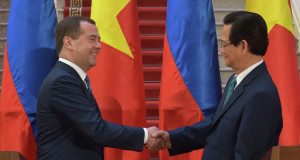
According to Shuvalov, the creation of the Free Trade Zone between the EAEU and Vietnam opens vast opportunities for investment cooperation and the rapid increase of turnover between the countries. Vietnam is a part of APEC and a member of ASEAN, a bloc, which includes 10 countries connected by the agreements on a free trade zone, as well as with China, New Zealand, Australia and others. Therefore, the Agreement with Vietnam can become the first step for the expansion of Russian influence in the greater Asian-Pacific region. The security of this partnership is reinforced by the fact that Russia can offer much to fast-growing Vietnam, including peaceful nuclear technologies.
Vietnam is developing exclusively in the sphere of nuclear power. At present, the country does not have any working nuclear power stations. The situation will soon change with the help of Russian partners. Japanese companies will also be attracted in diversifying this sector.
Demand for power in Vietnam is growing constantly, and the existing energy industry is finding it increasingly difficult to manage supply. This is why Vietnam has to import some of its electric energy from China. Coal power stations existing in the country damage the environment, while the construction of new hydro power stations is difficult due to natural and climatic conditions. Because of this, nuclear power is an optimal choice for Vietnam. Many countries have offered their assistance, and Vietnam has chosen Russia and Japan.
According to a statement by the Vietnamese authorities, 14 reactors are marked for construction by 2030. Construction of nuclear power stations has been extensively discussed and Vietnam has made statements about different plans, although none have come to fruition. Currently, the closest Vietnamese nuclear project marked for implementation is the Ninh Thuan-1 station in Ninh Thuan Province, situated in the south-eastern part of the country. It is the only nuclear facility at present to which all agreements are reached and the terms of construction and commissioning are discussed. Ninh Thuan-1 will be the first NPS in Vietnam, and it will be constructed by Russian companies. The main construction works will be completed by Atomstroyexport, a subsidiary of Rosatom. Rosatom is also responsible for fuel supply to the station and its subsequent removal after processing. It is also important to note that the Russian Federation is responsible for 85% of the project financing, providing Vietnam US$8 billion credit in 2011 plus US$500 million for the construction of a scientific training centre. However, the terms of the start of construction have been suspended several times. Originally planned for 2014, the terms were moved to 2019 at Vietnamese request. Now, in December 2015, the construction has been postponed until 2020 because of project security checks. This heightened examination is due to the tragic events which occurred at the Japanese station of Fukushima-1 and are still vividly remembered. Rosatom plans to participate in explanatory work to speed up the process. In particular, Russian specialists will participate in the corresponding actions of the National Assembly of Vietnam.
According to the statement of I. Shuvalov released by him after the session of the Intergovernmenta
Another project, and the second closest to implementation, is Ninh Thuan-2 station – construction of which will be realised by the Consortium of International Development of Nuclear Power from Japan JINED. The agreement concluded by Vietnam and Japan was signed in autumn 2010 in the same period as the agreement with Russia. According to its terms, Japan like Russia is responsible for 85% of financing of the project, fuel supplies and training. The construction was planned for 2015, but at the start of 2014 the Vietnamese Party reported the postponement of construction to a later date, which has not yet been announced.
Vietnam was also negotiating with South Korea regarding cooperation in the sphere of nuclear stations. Vietnam signed an Agreement on the start of a feasibility study of NPS construction with South Korea in 2012. Alongside these, Vietnam has also signed the same agreements with the USA, Canada and France, but implementation of joint projects has not been discussed.
Thus, Russia still remains the main partner of the Socialist Republic of Vietnam in the sphere of nuclear energy, despite the fact that the Vietnamese Party has tried to diversify cooperation with other countries.
Finally, I would like to mention that nuclear energy is a powerful instrument of international influence. It is not enough to construct a nuclear station; its maintenance, training and fuel supply are all crucial for the further operation of the station. NPS construction in hospitable countries represents not only a very profitable business, but a method to establish stable and deep-rooted international relations. The Ninh Thuan-1 project will potentially give the Russian Federation a permanent and durable foothold in Vietnam, and possibly in other countries of Southeast Asia.
Dmitry Bokarev, political observer, exclusively for the online magazine “New Eastern Outlook”.
